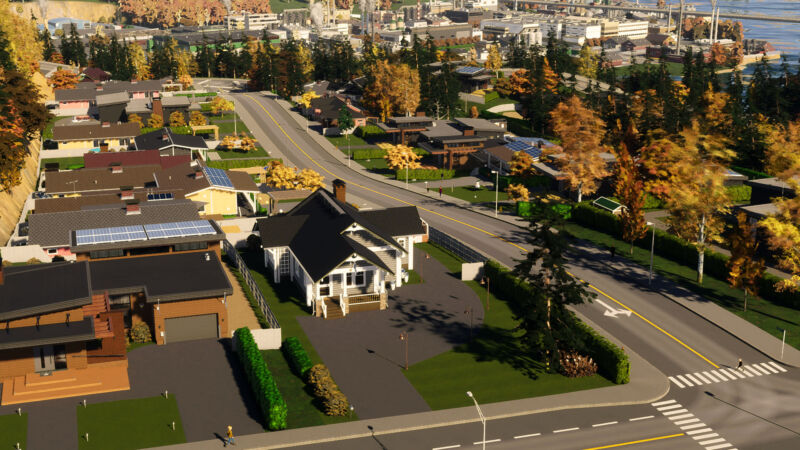
Paradox Interactive
City building simulations are not real life. They can be helpful teaching tools, but they abstract away many of the real issues in changing communities.
And yet, sometimes a game like Cities: Skylines 2 (C:S2) will present an issue that’s just too timely and relevant to ignore. Such is the case with “Economy 2.0,” a big update to the beleaguered yet continually in-development game, due to arrive within the next week or so. The first and most important thing it tackles is the persistent issue of “High Rent,” something that’s bothering the in-game citizens (“cims” among fans), C:S2 players, and nearly every human living in the United States and many other places.
C:S2 has solutions to high rent, at least for their virtual citizens. They removed the “virtual landlord” that takes in rent, so now a building’s upkeep is evenly split among renters. There’s a new formula for calculating rent, one that evokes a kind of elegant mathematical certainty none of us will ever see:
Rent = (LandValue + (ZoneType * Building Level)) * LotSize * SpaceMultiplier
And then there are the complaints themselves, filling players’ notification streams. While developer Colossal Order’s other fixes feel almost elegant in their simplicity, this one is a bit more grubby, like real life. If a citizen has a high enough income, but not enough liquid cash, such that they should have been able to swing this month’s boarding, “they won’t complain and will instead spend less money on resource consumption.” Cutting back on coffee bars and avocado toast should work, then, unless their income drops too low. Then, they will complain and “look for cheaper housing or move out of the city.”
Just like here, “There are no starter homes”
Once the patch arrives, C:S2 players might see their citizens “start looking for different types of housing or move around the city,” which tracks with the large model I happen to live in. Unlike that model, however, for the C:S2 citizens, living without unnecessary landlords, with simple rent calculations and a bit of belt-tightening, it “should help them afford the type of housing they prefer,” and most rent complaints should disappear after awhile. If they still can’t afford the rent, well, “check your unemployment and provide citizens with jobs so that they can pay their rent.” Simple!
As noted by PC Gamer, players have come up with their own recommendations for players facing high rent, some of them perfectly timely and relevant. “Zone more smaller sized homes,” writes one player/micro-economist, because just like in meatspace, “there are no starter homes left in and around major cities.”
There are, in fact, algorithms that try to determine an optimal price for rent in the real world, though they’re more for the non-virtual corporate landlords that are unlikely to be patched out. YieldStar, a collaborative rent-setting algorithm that suggests prices for open units, has helped large landlords push rent prices “to places that you wouldn’t have gone if you weren’t using it,” according to one satisfied customer. That kind of success has led to lawsuits from renters, Senate complaints to the Federal Trade Commission, and lawsuits from the District of Columbia and Arizona.



